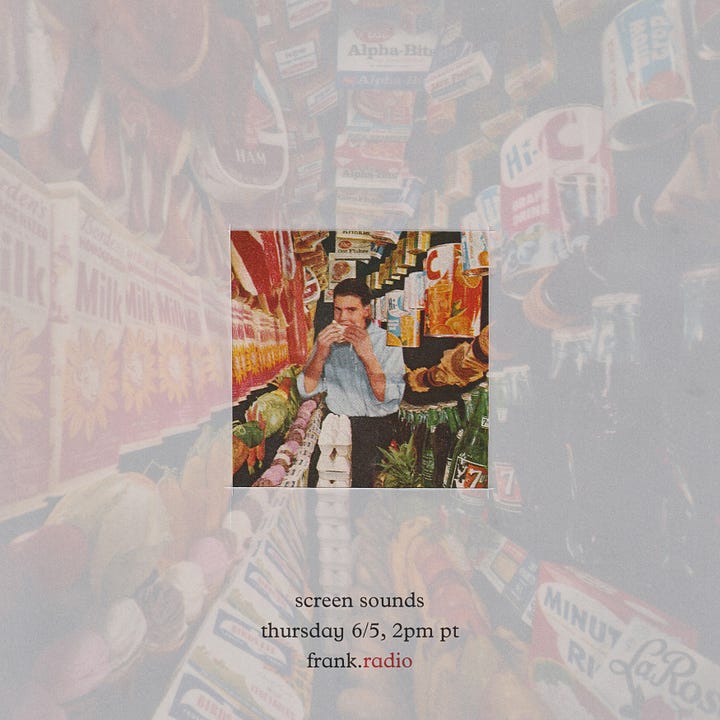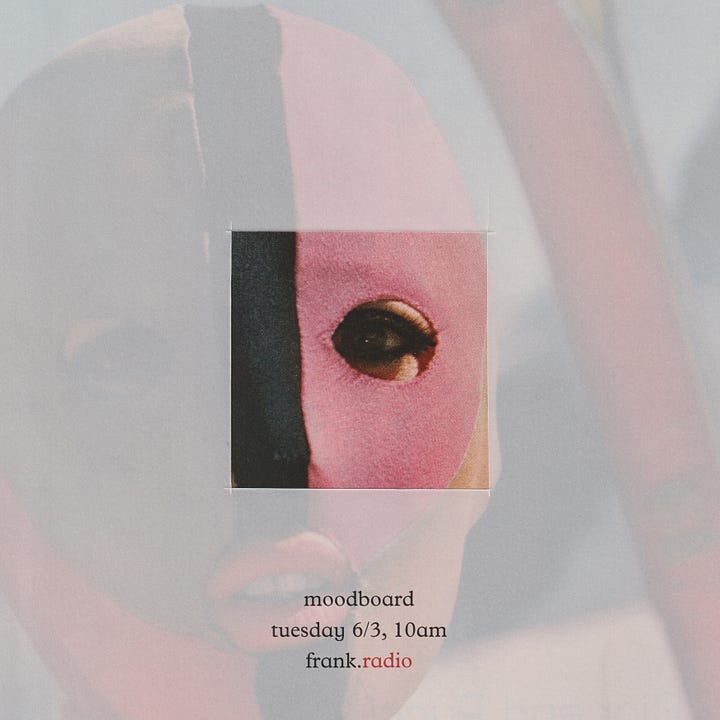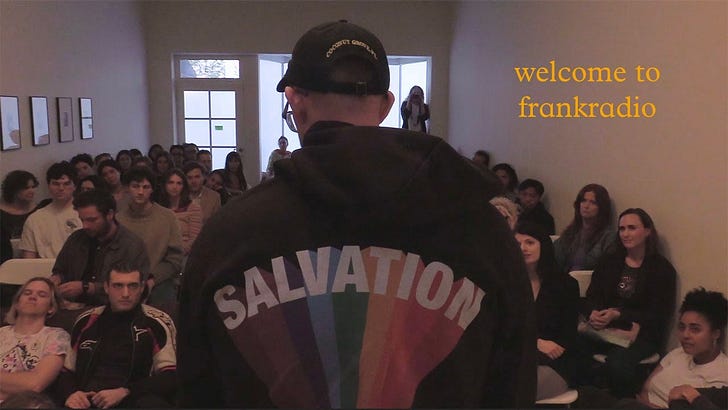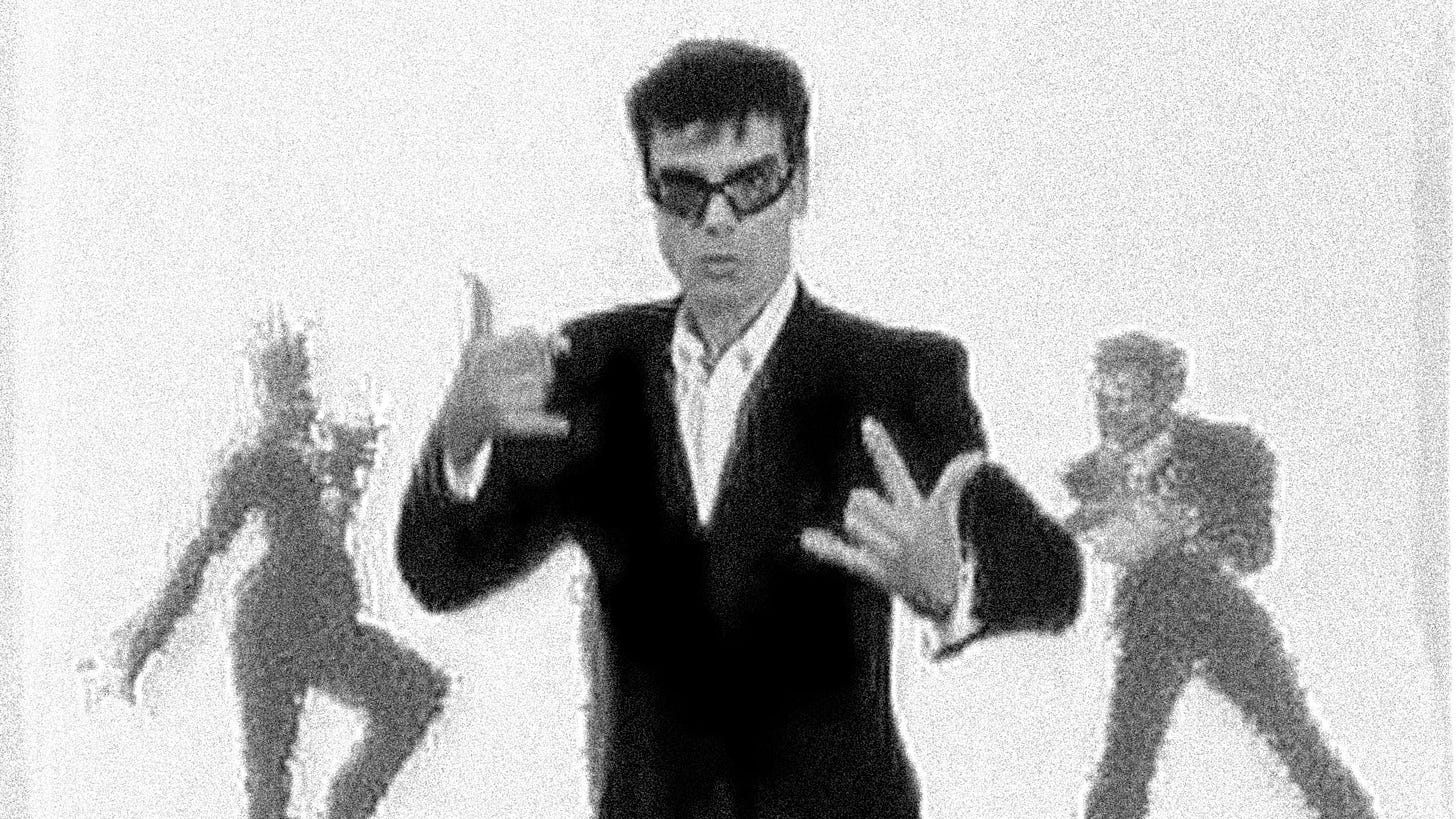Not News News
On the good guys, engaging in art to have power, using power to create art. This week's reading recs.
Some reading recs that arose from the week we spent on the internet. For you to watch, read, and listen to:
First off — recap of our first month of events at frankradio! Readings, screenings, Q+As... we did it all. Come by and say hi or pitch us! More info here.
The Popular Alternative - The state of A24 by Nathan Russel in Dirt: “A24 may not be exercising executive authority to alter scripts, but the company does seem to keep its eye out for films with themes and narratives that reiterate certain ethical platitudes and sociopolitical beliefs its audience already adheres to: conspicuous yet unthreatening depictions of diversity that trade in the maudlin for the incisive (Minari), queerness as illustrated via glancingly provocative sex scenes and fashionable postures (Love Lies Bleeding), trauma as a central and sometimes exclusive means of understanding a character (The Whale), and perhaps most prominently, emotions as metaphors (After Yang). Instead of a narrative object symbolizing a larger structure or idea, the structure or idea acts on the film by inserting symbols of itself.
While there is no default moral or ethical judgment to be made about the attempt at a cohesive aesthetic, there is a negative, even detrimental valence to a philosophy of consumption that views culture as merely a way to dispense salable objects. Disney is shameless about this strategy because it’s now expected of them. Being encouraged to foster one’s inner child, who wants for the sake of wanting, who seeks to be praised for the things they enjoy as if those things were an extension of their lives and therefore must be seen as good and valid—this infantile posture is rewarded within an ecosystem of consumption and shallow critical taste, where the primacy of emotion trumps the veracity of lived experience.”
In his essay Russel sited this B.D. McClay essay in The Outline, called, A Decade of Sore Winners:“In the arts, what this means is that passionate engagement and appreciation and hatred can all exist because the things you’re discussing don’t exist for you. They may be commodities, but they aren’t consumable products, like a tube of lipstick or a hamburger. They are rather objects that exist independently from you and with which you can build your own relationship. It means love without identification and hatred without rejection.”
We went on to read the rest of the article, and highly recommend. Another quote we liked was: “New York Times columnists and billionaires who think their critics are symptomatic of a second Holocaust? Sore winners. Conservative pundits who, flush with Trump’s favorable court appointments, indulge in ever-escalating paranoia over drag queen story hours are sore winners. Directors of Marvel films who were angry at Martin Scorsese for not loving their work are sore winners. The police are sore winners. Authors of young adult and “chick” lit who feel the need to compare criticism of their work to Larry Nassar’s sexual abuse of young girls are sore winners. The hierarchy of the Catholic Church is crawling with sore winners. Women who choose to conform to feminine expectations around weight, grooming, and makeup while penning long defenses of high heels, shaving, and lipstick are sore winners (though they are also, in their way and on a higher level, losers). Adult gifted children are sore winners. And so on.
If you are fighting for dominance, and you don’t have it, begin to ask yourself what you’ll do with it if and when you do, to whom and how you want to be held accountable. A lot has been written on the abuse of power. But think, at least a little, about how you’re going to use it, too.”
Ross Barkan wrote about the “end of prestige” and the discourse around the “vanishing white male Millennial literary writer” in his Substack: “My own concern for the male reader and writer—and this does transcend race—is that this country is going to get much worse if men completely remove themselves from the humanities. Yesterday’s litbro bragging about his postmodern bookshelf is today’s red-pilled podcast bro, trending towards inceldom. There’s not a 1:1 relationship here—I have certainly not undertaken any scientific studies—but I can tell you, anecdotally, 2000s heterosexual men still regularly discussed novels, harbored literary aspirations, and used books to meet women. Aspiring pick-up artists should know being well-read is still a great way to meet attractive women, especially as men fade from the arts and the number of eligible bachelors who know anything about Catherine Lacey, Emma Cline or Clarice Lispector rapidly approaches zero. But here is where prestige does matter: men, especially white men, still make plenty of money and enjoy a great deal of power in this country. Today’s male teenager is enthralled by crypto billionaires, start-up founders, famed YouTubers, and popular streamers on sites like Twitch. They like action and fast money. Once upon a time, they may have found some of that in Norman Mailer, Philip Roth or John Updike—men who seized their pot of gold and were never wanting for sexual partners—but they have no literary idols in the 2020s. Young novelists aren’t famous anymore, and none swagger about since that behavior is considered uncouth or outright toxic. They have good, predictable politics and they exist to get along, as politely as possible, with others. I myself did not become a writer because I admired Roth’s sex life or Franzen’s ability to command the discourse every once in a while, but it didn’t hurt that they were out there, stars burning bright.”
And while we are on the topic of idols, and heros, and men — this interview with critic Ted Gioa was fun. Harrison Ford and the Origin of Western Civilization on his Substack: “You may think that the great achievements of the West are built on armies and killing. I prefer to view it as the result of more peaceful longings to be back home and in bed again. This is in fact the greatest literary theme of Western culture.”







